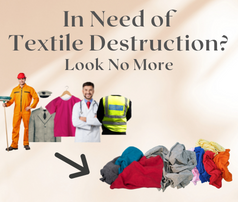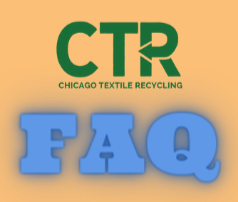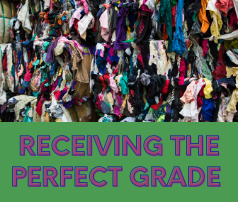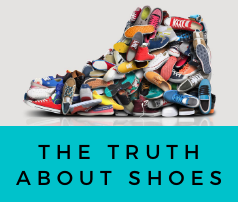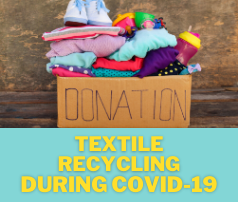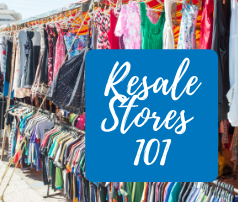 Programs
Programs

Nearly a year ago, we shared a blog about where recycled textiles go once they have been donated to a bin, or to a resale store. From sorting to consolidating to grading to their final destination, recycled textiles can go on to have a lengthy second life after you choose to donate them.
So what happens when your donations are placed in the store for resale? Are they simply resold as is, in the same condition you dropped them off? What do resale stores do with the money from sales? And do all salvageable items go on the floor?
Behind the Scenes
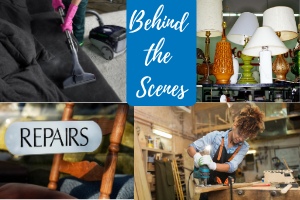
The behind the scenes look at local and chain resale stores is quite fascinating. Many stores go the extra mile to repair or clean salvageable donations with minor problems before placing them on the sales floor. Skilled craftsmen are employed in addition to those on the sales floor to repair these minor fixes.
“Upholstery is cleaned, and couches are shampooed, cleaned and sanitized. Electronics are plugged in to make sure they work. Donated mattresses are taken apart and rebuilt by a company before being resold at the store…In the woodshop, workers go through pieces of furniture. ‘If it’s salvageable, they’ll clean it up, make minor repairs if they can,’ Burleigh said.” (Read more here)
However, not all donations are salvageable. So what do resale stores do with these items?
“Furniture and other items that aren’t fit for sale in the Salvation Army store because they’re stained or defective are taken to the As-Is warehouse behind the processing center to await public auctions on Monday, Wednesday and Friday mornings. Store merchandise not sold within three weeks also gets auctioned.”
This is why in our previous posts we have pointed out that it is important to make sure your donated items like electronics are in working condition. A working toaster or cd player is going to bring in more money for the resale store than a broken one, which may not bring in any. The sale of these items puts money back into the community and supports charitable causes.
Partner Programs
In addition to the two options of sales floor or auction, resale stores have partnership programs with local and/or national businesses and organizations:
“Goodwill participates in the Dell Reconnect program, in which computers that can’t be refurbished are recycled, and Dell pays Goodwill for the materials. Another partnership is with the nonprofit Shared Knowledge Literacy Foundation, which looks for unsold books with high-value titles that can be sold online.”
Many other resale stores also find local programs that can offer mutually beneficial partnerships, such as a thrift store in Virginia that donates books to “The Up Center for literacy programs.”
Partnership programs is where Chicago Textile Recycling fits in with resale stores. We have a partnership program with over 40 local Chicagoland resale stores to help them raise funds from their unsaleable clothing, purses, shoes and belts. Acting as a consolidator for these stores, we partner with them so that they too can raise money for local charities just like the bigger name resale stores.
Where Does the Money Go?
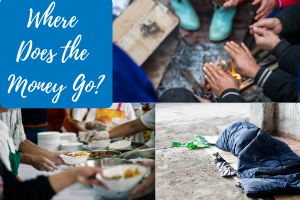
The next question you may be wondering is what do resale stores do with the money made from your donations? Of course some of the money has to go back into paying the store’s rent and utilities and paying employees, but the remaining profit oftentimes goes back into community programs and local charities. “All the money made in local Goodwill stores goes back to community programs – job training and career development for people with disabilities or obstacles such as homelessness.”
Resale stores have a variety of programs they support with the money made from sales:
“All proceeds raised by local stores go toward the Salvation Army Adult Rehabilitation Center, which houses 114 men for six months to a year as they fight drug and alcohol addictions. To feed them three meals a day costs $20,000 a month, Burleigh said, in addition to expenses such as heat, water and electricity.”
Local (non-chain) resale stores typically have other community programs and charitable causes they work with. Many stores in our own Chicagoland area support homeless shelters, low-income families, and other programs.
This is why here at CTR we believe so strongly in what we do. Many of our recyclers previously gave their excess to the big guys – and then weren’t able to raise funds for their own critical programs. We stepped in and began consolidating all their unsaleable items with those from other local small business resale stores. The money they make from our purchase of those items goes back into our city supporting many great and vital programs in the community. We love supporting the people in our city and local small businesses while also caring for our planet.
Donations to Sales Floor or Somewhere Else?
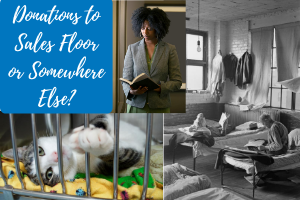
After your donations have been sorted, there are many options as to where they can eventually wind up. As stated earlier and in previous blog posts, some donations go to auction, some to other countries, some to make rags or insulation, and some to the sales floor or local shelters.
“At the Union Mission Ministries store in Norfolk, in-house use is the top priority. ‘The first thing we do when we get items donated like clothing, we see where we can use it in our shelters,’ said Linda Jones, the mission’s public relations director. The approximately 350 people in the shelters get free clothing, and if they move into apartments, they are given household items. The next priority: poor people in the community, who receive vouchers and can pick out items from the store for free.
Whatever’s left after that is open for sale to the public, Jones said.”
Another resale store owner shared about a similar end for donations,
“Clothing that doesn’t sell is given to shelters for people in need, and linens that are stained or otherwise can’t be sold are donated to local animal shelters and animal hospitals, said Frances Ross, the Norfolk store’s assistant manager.”
Where We Fit In
Here at Chicago Textile Recycling, we support small resale stores so that they can turn around and give to local shelters and other charitable organizations. Many cannot generate the volume of larger stores, so we purchase clothing items that are unsaleable and typically send them to a business who specializes in sorting and processing. We specifically serve as a consolidator and help fill full truckloads of baled unsaleable textiles (43,000 lbs at a time). This allows small resale stores to raise funds the same way the bigger name resale stores do and support their local nonprofits.
This is one big reason thrift or resale stores are so vital in our communities. They work to provide thousands of people with clothing and other household goods.
Why Choose Resale
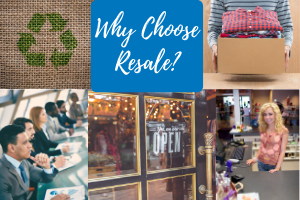
Here are some of the many ways resale stores are important for our economy and the health of our planet:
- They “employ tens of thousands of people”
- “Generates at least $18 billion in annual revenue”
- “Keeps an enormous amount of used stuff out of landfills”
- “Contributes billions each year to social-service and job-training programs that are crucial to communities nationwide”
(Statistics found here)
After understanding the myriad of ways resale stores benefit our communities and planet, where CTR fits in as a partner to resale stores, and knowing the problems fast fashion potentially create, why not choose resale for all of your shopping needs?

